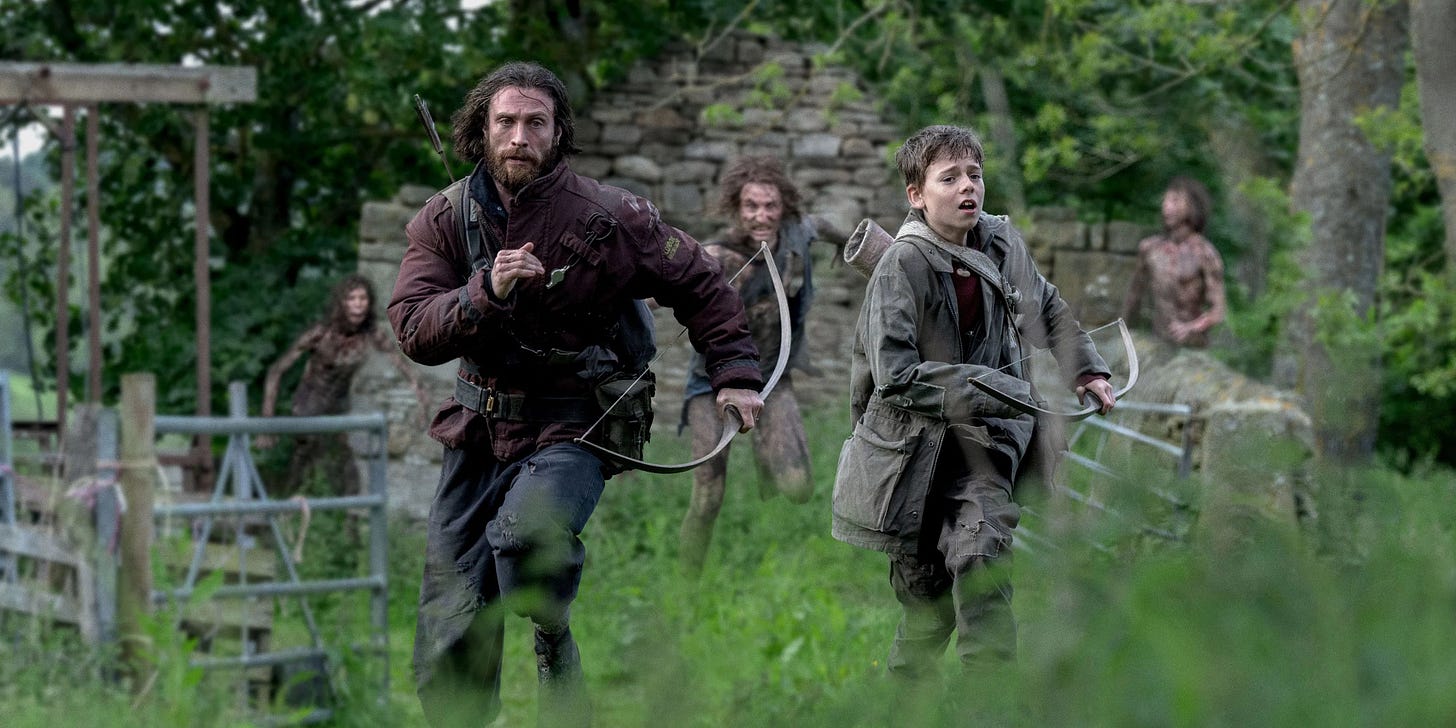'28 Years Later' Is The Best Thing I've Seen All Year | Review
A heart-wrenching, thrilling triumph of genre filmmaking.
Warning: The following review discusses plot elements of all three entries in the franchise.
The first two entries in the 28 [Unit of Time] Later… series are remarkably prescient films about 21st-century paranoia.
There are surface-level concerns with disease and how people turn on each other in the face of an all-consuming pandemic and the breakdown of civil society.
And then there is the deeper concern with what happens when those charged with protecting us are the ones who harm us.
Danny Boyle’s 28 Days Later, released in 2002 and written by series collaborator Alex Garland, tells the story of the immediate aftermath of the outbreak in London. The film’s third act plays directly with the most prominent zombie story trope: “Fight the Dead. Fear the Living” by pitting the central adoptive family unit against a group of soldiers who present clear threats of sexual violence.
28 Weeks Later, produced by Boyle and Garland, is a direct reflection of post-Iraq invasion fears about nation-building. It depicts an arrogant American military undone by its overconfidence in its knowledge and abilities. Some of its most disturbing moments come when, during an outbreak, the military members begin shooting indiscriminately into a crowd of fleeing people, unable (or perhaps unwilling) to discern between infected and uninfected.
But beyond the two films’ depictions of the rage-infected people, there’s a very clear through-line about abusive parental figures. This is most explicit in 28 Weeks Later, where Robert Carlyle’s Don opens the film by abandoning his family to their death to save himself. He later seeds the outbreak in the quarantine zone because he wants to salve his conscience. The film repeatedly brings the infected Don back to threaten his children.
28 Years Later, the third entry in the franchise and the second directed by Boyle, builds on these themes during its fairly conventional first half before a significant tonal swing turns the second half on its head. The first half plays out like a straightforward post-apocalypse story. We are introduced to the island enclave where a New Britain has been created, complete with a portrait of a young Queen Elizabeth.
Boyle splices in film reels of cinematic depictions of battles in British history, cementing how the story of the Rage virus outbreak takes its place alongside other retellings of British history. It situates this story as the latest in a line of stories about the conflicts that create British history and culture.
Jaime (a characteristically gruff Aaron Taylor-Johnson) takes his 12-year-old son Spike (a breakout performance by Alfie Williams) on a coming-of-age journey to the mainland to get his first kills. The pair encounter requisite Infected trouble and after a number of tense encounters, they return. An undercurrent of rough hostility in Jaime comes to the forefront, causing a fallout between father and son.
Lurking in the background of the story is Spike’s sick mother (a transformative Jodie Comer). Spike, determined to diagnose and save his mother and disillusioned with his father, strikes out from the safety of the island with her to locate a mad doctor (the always dependable Ralph Fiennes, who does incredible work in limited screentime). Spike hopes against hope that the doctor, without access to modern medicine and whom Spike has been warned away from pursuing, can cure his ailing mother.
The second half maintains its intense pace, but it becomes a much quieter film about the other sides of sickness and death. Spike’s faith in preserving human life is contrasted with a cold, amoral world where might makes right and the only relevant disease is the one that transforms you into a monster. Spike’s desire to save his mother and care for a new life in their midst give the film its emotional core.
The tonal shift away from a standard action movie elevates 28 Years Later to the status of a near-masterpiece. The quieter, subdued third act allows the viewer to breathe and contemplate the film’s central theme of preserving life in a world where survival is the objective, not the means, of living. Comer’s portrayal of a struggle with a non-Rage disease is gut-wrenching.
The film is a surprisingly hopeful and emotional story that feels thematically connected to its predecessors in its depiction of a dishonest and failing patriarch, but that explores new ground. There’s enough in 28 Years Later to satisfy zombie genre fans while still leaving more than enough meat on the bone to tell a bigger story about human mortality. For a franchise preoccupied with 21st-century concerns, it’s a refreshingly timeless story.
‘28 Years Later’ is now playing in theaters nationwide. Rated R for strong bloody violence, grisly images, graphic nudity, language and brief sexuality.





I think Sinners has higher cinematic highs (the literal barn-burning musical scene) but 28YL has emotional highs that Coogler can’t top. Just incredible moviemaking.